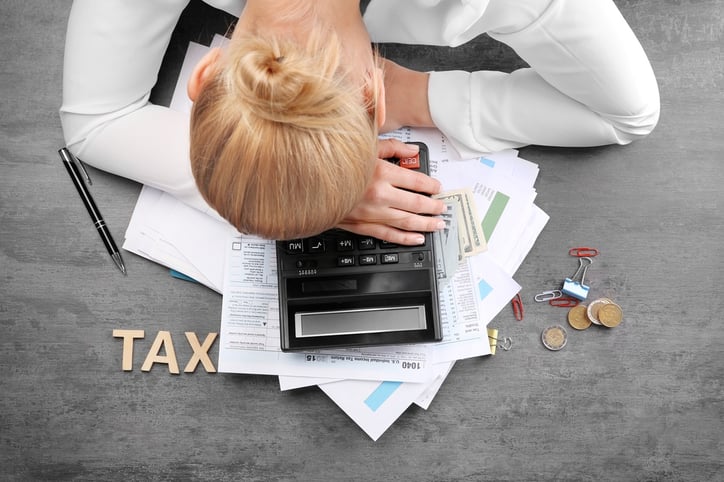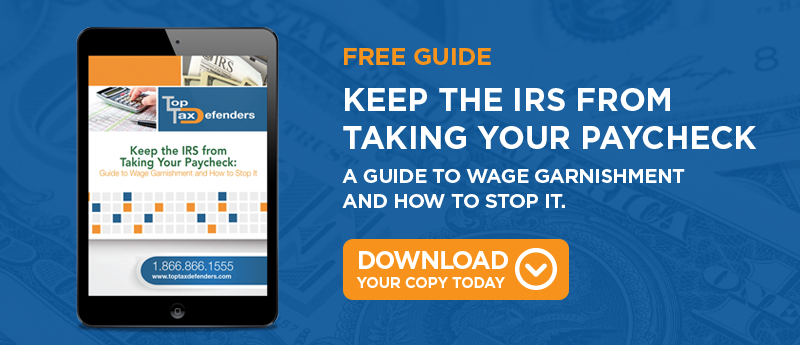
You may have every intention of filing and paying your taxes on time each year. However, at some point you may experience an issue that prevents you from being compliant with the IRS.
Because the smallest tax paying error can have long lasting ramifications on your finances, you are encourage to research how you can resolve the issue in your favor. You can overcome the four most common tax problems people face by discovering the best solutions for them.
Download our FREE guide to understanding and fighting IRS wage garnishments >>
Unfiled Taxes
Out of all of the mistakes, the most common is arguably not filing your taxes on time. When you have unfiled taxes, you put yourself in jeopardy of not only incurring expensive fines and penalties but also being sentenced to jail.
In fact, the IRS considers not filing your taxes to be a form of tax evasion. You could face up to a year in jail and a fine of up to $10,000.
Because of these severe punishments, you should file your late returns as quickly as possible. You must have them filed if you want to request a payment arrangement or installment agreement from the IRS. Once you file your returns, you will be considered to be in compliance with the IRS and no longer in jeopardy of incurring heavy fines or jail time.
Inability to Pay
Perhaps you have not filed your taxes yet because you know that you cannot pay what you owe. Rather than avoid filing your returns out of fear of a heavy tax burden, you should learn about the payment options the IRS makes available to people with significant tax debts.
You may be eligible for any number of payment or settlement methods like:
- the IRS Fresh Start Program
- installment agreement
- OIC or Offer in Compromise
- CNC, or Currently Not Collectible, status
These options let you pay or extend your debt and protect your finances. Before you choose which one best suits your needs, you should consult with a tax professional who can advise you further on each one. The tax professional can also help you complete and submit the proper documentation for each solution.
Penalties and Interest
When the IRS charges penalties and interest, you must pay even more money to settle your account. These extra charges add to your burden and lengthen the time that it takes to pay what you owe to the government.
The solution to incurring penalties and interest is to ask for a penalty abatement from the IRS. You could make this request on your own. However, when you want it to be decided in your favor, you should allow a tax pro to ask for the penalty abatement on your behalf.
To be granted this courtesy, your tax case must meet three requirements that include reasonable cause, administrative waiver, or IRS error. Your tax pro can ensure that your case meets at least one of those criteria before filing the request for you.
DO YOU NEED IRS TAX HELP?
SCHEDULE A FREE CONSULTATION WITH OUR TAX EXPERTS »
Garnishment and Levies
The IRS gives you ample opportunity to pay what you owe or work out a payment arrangement with the government. When you fail to take advantage of this opportunity or you do not comply with the agreement that you set up with the IRS, you could have your income garnished and a a lien placed on your assets.
When the IRS garnishes your income, it has the right to do so without a court order. It also can take more than the typical 25 percent allotted by states when allowing creditors to seize a portion of your income. In reality, the IRS can take however much of your paycheck it chooses although it generally leaves you enough to support you and your family with each month.
Still, the free reign that it enjoys when it comes to taking your income and assets should give you serious pause. If you are already being garnished or levied, your solution would be to file a lien/levy or garnishment release.
Filing this release should be done in conjunction with a tax pro who knows how to submit this request accurately and in a timely manner. You may need to prove that the collection efforts cause financial hardship to you and your household. Your tax pro can negotiate the terms of the release and work out another payment method that protects your finances and works to your advantage.
Making the occasional taxpayer mistake does not have to take a toll on your money. You can safeguard your earnings, protect your assets, and get back in compliance with the IRS by knowing the solutions to the four most common tax paying mistakes that Americans make today.


